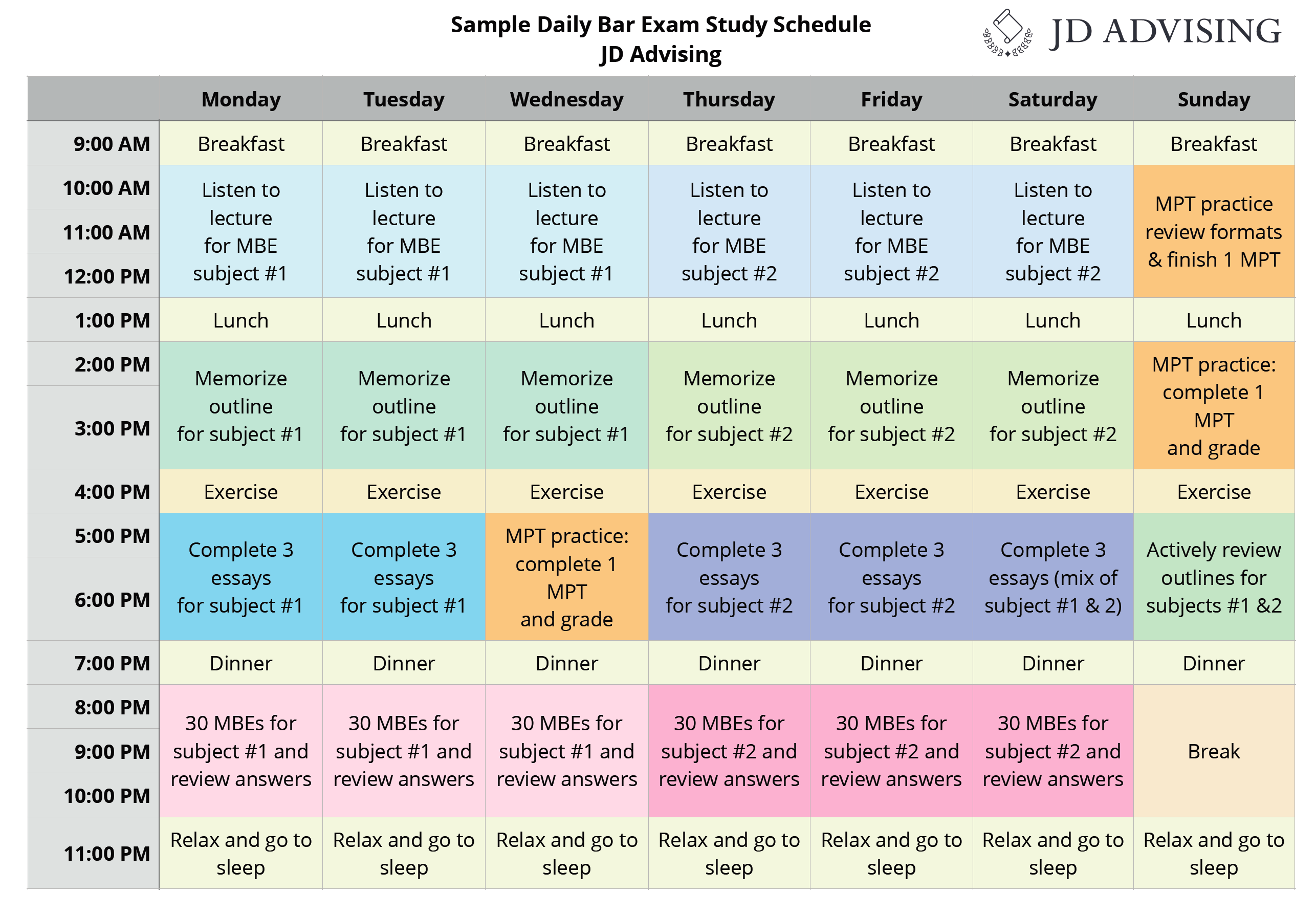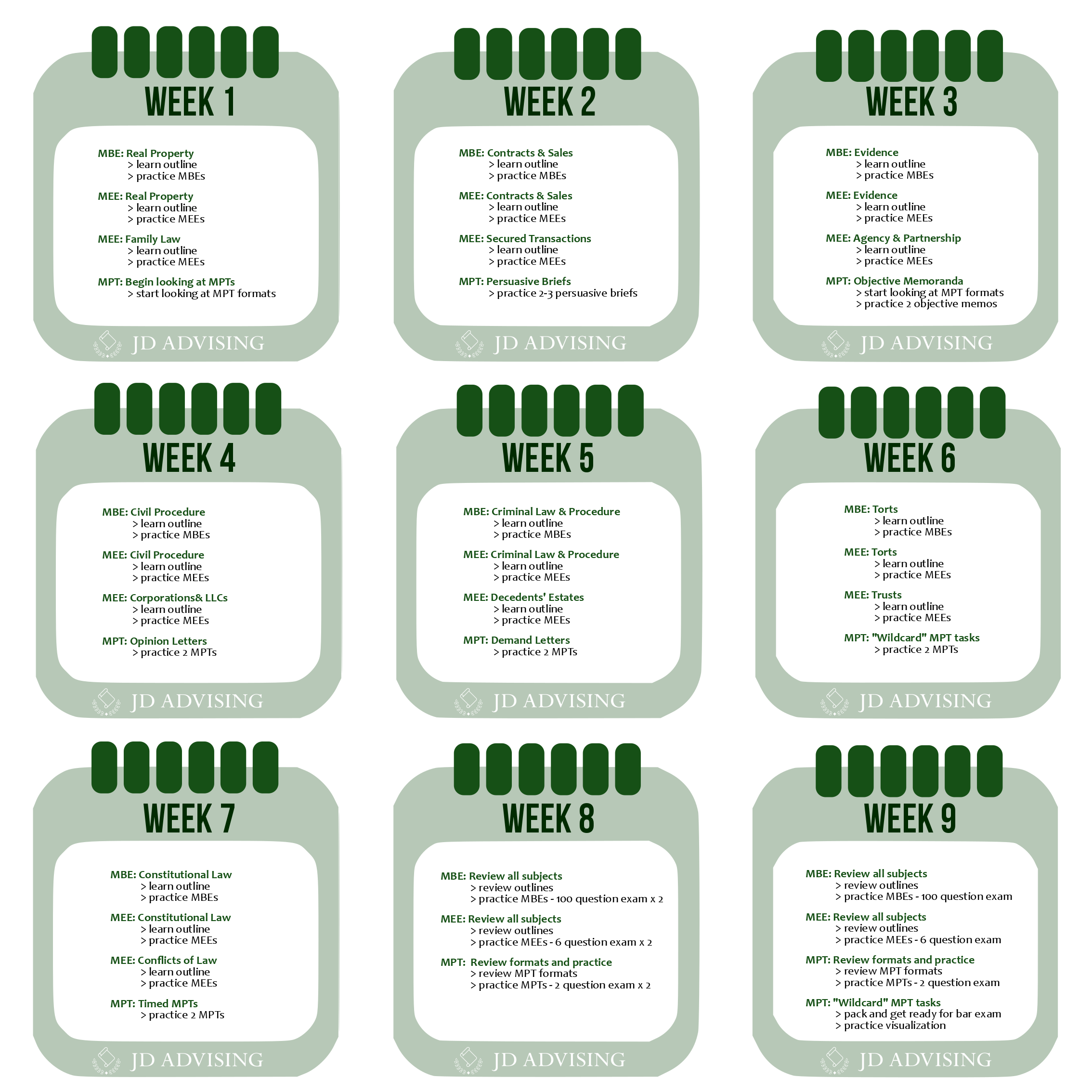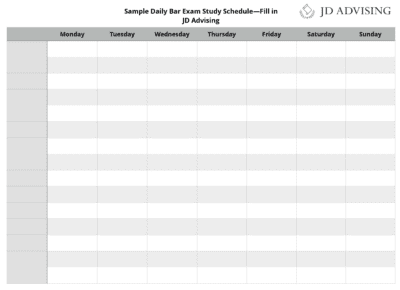How to Make a Stellar Bar Exam Study Schedule
How to Make a Bar Exam Study Schedule
How to Make a Bar Exam Study Schedule
A good bar exam study schedule is crucial. It can ensure that you allocate the proper amount of time to studying each subject. It gives you a sense of control, can decrease stress, and can help keep your days and weeks more organized (and therefore, more efficient). In this post, we talk about how to make a weekly bar exam schedule as well as how to make a daily bar exam study schedule. If you want to see a study schedule specific to the Uniform Bar Exam, see this post!
In order to make your bar exam study schedule, it will be helpful if you have a blank weekly calendar in front of you.
How to Make a Bar Exam Study Schedule
Here are the steps to making a stellar bar exam study schedule:
1. Figure out when you are going to start studying for the bar exam.
This schedule assumes that you will start studying for the bar exam about nine weeks early. We always recommend you start studying earlier rather than later—so if you are able to start earlier than nine weeks, that is even better. Starting early will relieve some anxiety and give you extra time to learn the information.
We especially recommend you start studying early if:
- You did not have a good understanding of the material your first year of law school (since this material is most heavily-tested on the bar exam);
- You are a repeat bar exam taker that has failed the bar exam in the past; or,
- You have substantial commitments to fulfill during bar exam preparation (for example, a full-time job).
2. Figure out when you want to stop learning new material so that you can do a major review of all of the subjects.
Most people prefer to have at least two full weeks before the bar exam to review the material they have learned. The mock schedule below leaves two full weeks to review.
3. Fill in the weeks between your start and end date, and plan on covering one major multistate bar exam subject per week.
In our nine-week schedule, you should have seven weeks to learn substantive law and then two weeks to review. You can learn one MBE subject per week with this schedule.
If you have “extra weeks” (that is, more than seven weeks to learn substantive law), then spend extra time on your hardest MBE subjects. If you have fewer weeks (that is, less than seven weeks) to study before your review weeks, then double up on the MBE subjects that you find the easiest and conquer them in a week. If you are starting really early (i.e. starting in January for the July bar exam) it is a good idea to add a review week or two to the middle of your schedule as well.
4. Add between two and four state-specific subjects to cover each week.
If you are taking the UBE, then the good news is, you only have 7 additional subjects to learn—so you could add one per week!
It helps to cover them in groups and learn similar subjects during the same weeks. Agency, Partnership, and Corporations (the business subjects) could be covered in the same week. Wills and Trusts could be covered another week.
It is also a good idea to try to combine highly-tested subjects with less-tested subjects and your most difficult topics with topics that are easier for you. For example, if you feel very confident about the MBE topic Torts, but very uncomfortable with Secured Transactions, you could try to cover them both in the same week. That would make it more manageable than covering a difficult MBE topic at the same time that you cover a difficult state topic.
5. If your state administers MPTs, do not neglect MPTs!
Start practicing early and often! They are worth 20% of your score in a UBE state and cannot be neglected!
6. During the last month, make sure you have perfected your timing.
Plan on taking entire exams—take both multiple-choice exams and essay exams. Simulate exam conditions.
7. During the last week, make sure you are physically and mentally prepared.
Make sure you have everything you need with you. Confirm your reservations. Confirm your mode of transportation.
If you find yourself nervous or anxious, practice visualization before the bar exam. We recommend you begin visualization a few days ahead of time to calm your nerves. Visualize yourself (in as much detail as you possibly can) doing well on the bar exam. Visualize yourself having a clear head, recalling the law, and completing the questions in a timely manner. Some students find it helpful to visit the actual testing room ahead of time to better complete this exercise. Practicing visualization exercises the days preceding the bar exam—especially the night before and the morning of the exam—can increase confidence, boost motivation, and mentally prepare you for the task ahead of you. It diminishes the nervous energy and anxious thoughts that block your brain from thinking clearly and recalling the law. Visualization has the power to give you a positive mental outset and a competitive edge.
Example of a Weekly Bar Exam Study Schedule:
Here is an example of a weekly bar exam study schedule you may want to use!
Week One:
MBE Subject 1: Real Property
State subject: Real Property
Week Two:
MBE Subject 2: Contracts and Sales
State subject: Contracts
State subject: Sales
State subject: Secured Transactions
Week Three:
MBE Subject 3: Evidence
State subject: Evidence
State subject: Agency
State subject: Partnership
State subject: Corporations
Week Four:
MBE Subject 4: Civil Procedure
State subject: Civil Procedure
State subject: Family Law
Week Five:
MBE Subject 5: Criminal Law and Criminal Procedure
State subject: Criminal Law
State subject: Criminal Procedure
State subject: Wills
State subject: Trusts
Week Six:
MBE Subject 6: Torts
State subject: Torts
*TAKE FULL ESSAY EXAM
Week Seven:
MBE Subject 7: Constitutional Law
State subject: Constitutional Law
State subject: Conflict of Laws
*TAKE FULL MBE EXAM and ESSAY EXAM
Weeks 8 and 9
Review all subjects these two weeks.
*TAKE FULL EXAMS
Pack for the bar exam.
What should my Daily Bar Exam Study Schedule Look Like?
Having a daily routine is crucial to succeeding on the bar exam. You need to put in the time, but you don’t need to (and shouldn’t aim to!) study 14 hours a day! If you are not working, it is a good idea to make bar exam studying your full-time job. If you are working or have other substantial obligations, you will have to find as much time as you can on weeknights and weekends.
Generally speaking, there are three things you need to do in order to do well on the bar exam. You should keep this in mind when creating your daily schedule:
- First you need to understand the substantive law. If you do not understand how it works, it will be very hard to memorize it and apply it. Students gain understanding through private tutoring, commercial courses where the law is explained, or sometimes by just going through outlines slowly!
- Next, you need to memorize the substantive law. It is not enough to “get how it works when you see it.” You need to know it WELL!. The best way to do this is to use an active review process (quizzing yourself by covering up the material and trying to rewrite it, for example. Or making diagrams, charts, concept maps, mnemonics.) Do this week by week! Do not put memorization off to the end!
- Third, you need to apply the law. This means doing practice multiple choice questions and essay questions. Focus more on quality when you answer questions, rather than quantity (to see what I mean, read this post: A step-by-step guide to improving your multiple-choice score.)
Thus, when you study for both the MBE and essay subjects, it is important to spend a good portion of your time understanding and learning the law and a good portion of your time answering practice questions. Indeed, the bar exam tests whether you know the law and are able to apply it. Make sure that you are spending your time appropriately. If anything you are doing does not further your understanding, memorization, or application of the law, don’t do it! (For example, if you get nothing out of lectures, stop watching them!) You need to spend your time as efficiently as possible.
Example of a Daily Bar Exam Study Schedule:
If you are planning on studying eight hours a day, a day might look like this:
- 9:00 – 11:00 Learning the law (lecture, private tutor, or going through your outlines slowly)
- (11:00 – 11:30 – break!)
- 11:30 – 1:30 learning your outline (memorizing it!)
- 1:30 – 3:00 Practice multiple-choice questions for the subject(s) you reviewed.
- (3:00 – 3:30 break!)
- 3:30 -5:00 Practice essay questions for the subject(s) you reviewed.
- 5:00 – 6:00 Review your outlines again (or work on whatever you think you need to work on during this time).

Note, if you find you struggle with a certain area (like understanding the law) you can tweak your schedule accordingly. If you start early, you will give yourself a cushion to do everything you need to do in a short amount of time!
Looking to Pass the Bar Exam?
Free Resources:
- 🌟Bar Exam Free Resource Center: Access our most popular free guides, webinars, and resources to set you on the path to success.
- Free Bar Exam Guides: Expert advice on the MBE, the MEE, passing strategies, and overcoming failure.
- Free Webinars: Get insight from top bar exam experts to ace your preparation.
Paid Resources:
- 🏆One-Sheets: Our most popular product! Master the Bar Exam with these five-star rated essentials.
- Bar Exam Outlines: Our comprehensive and condensed bar exam outlines present key information in an organized, easy-to-digest layout.
- Exclusive Mastery Classes: Dive deep into highly tested areas of the MBE, MEE, MPT, and CA bar exams in these live, one-time events.
- Specialized Private Tutoring: With years of experience under our belt, our experts provide personalized guidance to ensure you excel.
- Bar Exam Courses: On Demand and Premium options tailored to your needs.
- Bar Exam Crash Course + Mini Outlines: A great review of the topics you need to know!
🔥 NEW! Check out our Repeat Taker Bar Exam Course and our new premier Guarantee Pass Program!







Leave a Reply
Want to join the discussion?Feel free to contribute!